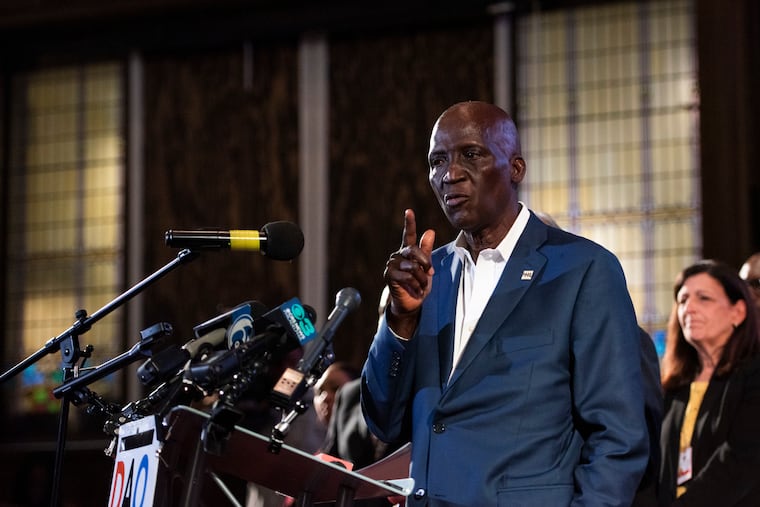$22 million in public, private funds will build new Africa Center in Southwest Philly, developer says
The plan includes offices, stores, and a restaurant. Next door will be a community center, school, and medical clinic.

Federal, state, and city taxpayers, banks, and nonprofits have committed the $22 million needed to build Africa Center, the long-sought social services and retail hub planned by ACANA, the African Cultural Alliance of North America, led by members of West African immigrant communities in Southwest Philadelphia and nearby neighborhoods.
Voffee Jabateh, founder and executive director of ACANA, said in a statement that he hoped the 37,000-square-foot Africa Center would also anchor a larger redevelopment project he calls Dolakeh Square, meaning “people rising together” in the Mano language used in parts of Liberia and neighboring Sierra Leone. He said he envisioned an African-immigrant version of Philadelphia’s Chinatown retail and government-assisted housing district.
On the site of a former dry cleaner and neighboring properties at 5432-36 Chester Ave., ACANA plans offices, stores, and a second location for Youma Ba’s Kilimanjaro Senegalese restaurant and catering, according to Ahsan Nasratullah, the project developer.
Next door at 1511-17 S. 55th St. plans call for a community center on the first floor, a branch of the Woodland Academy on the second and third floors, and a clinic on the fourth floor, to be run by Helena Kwakwa, a Ghana native who runs two nonprofit Newlands Health clinics in Northeast Philly and works as HIV medical director for the city’s outpatient health centers.
The project includes renovation and new construction — and a series of land and financing deals put together with help from the Philadelphia Industrial Development Corp., the city’s public-private economic development entity focused on finding and financing projects for vacant commercial properties.
The funding arrangement is “a complex financial transaction” designed to attract jobs and investments through a “cultural, economic, and social community epicenter,” said Lawrence McComie, chief credit officer and senior vice president at PIDC.
Nasratullah credited City Councilmember Jamie Gauthier with connecting him to Im Kwang, a Korean immigrant who formerly operated the dry cleaner. Kwang agreed to sell the property for $300,000, which Nasratullah said was less than market value, in a deal conducted entirely through text messages. PIDC helped ACANA acquire the 55th St. property at a nominal price through the city Land Bank.
ACANA’s current headquarters and the programs it supports are housed in a three-story building at 5532 Chester and attached two-story buildings at 5534-36 Chester.
PIDC officials, ACANA leaders, and Africa Center supporters say they hope the project will draw more construction and investors to the aging neighborhood business district at a time when some business-minded immigrants and their children have relocated to nearby Delaware County and other suburban areas.
About one-quarter of Southwest Philly residents were born outside the United States, compared to one in seven Philadelphians and one in 11 across the metro region, according to the 2020 U.S. Census. The neighborhood’s median income is below the city average, though it is located between University City and the Philadelphia International Airport district, both of which are attracting substantial development.
Instrumental in the fundraising were JNA Capital, an investment company cofounded by developer Nasratullah and his wife, first-term City Councilmember Nina Ahmad; and Fattah Capital Advisors, a consulting firm founded by former U.S. Rep. Chaka Fattah, according to ACANA.
A list of Africa Center funders provided by Nasratullah and confirmed by city officials includes:
$9 million in state matching funds awarded by the state Redevelopment Assistance Capital Program, which subsidizes private and public construction projects across Pennsylvania.
$4.5 million in equity investment by Capital One N.A., the Virginia-based credit card giant, financed by federal New Markets Tax Credits arranged through PIDC and the Lancaster-based Community First Fund and its Finanta unit.
$3 million from the Philadelphia Commerce Department, mostly from the federal Community Development Block Grants program.
$2.4 million from Nasratullah’s Global City Regional Center LLC, which raises money from wealthy immigrants under the federal EB-5 dollars-for-visas program. Nasratullah’s company also raised $8.8 million for the $75 million Crane apartment tower in Chinatown, which ACANA leaders see as a model for the Africa Center development.
$2 million in federal Community Project Funding dollars, with help from U.S. Rep. Mary Gay Scanlon, a Democrat who represents portions of Philadelphia and its suburbs.
$1.5 million lent by United Bank of Philadelphia, a $55 million-asset lender, focused on the city’s Black communities, that reported $3.3 million in profits in 2023, its best result since the bank’s founding in 1992, according to FDIC records
Temporary funding to pay for construction while waiting for the government and loan money to arrive will be provided by the Philadelphia-based Reinvestment Fund, with help from Beech Capital Venture Fund Corp. and the Neighborhood Progress Fund.
“We are thrilled to partner with [ACANA] and provide bridge lending to this community-supported, Black-led project,” Kareem E. Thomas, the Reinvestment Fund’s chief credit officer, said in a statement. He added that the fund supports “ACANA’s mission to help refugees, immigrants and other community members access critical health care and social services.”
This story has been updated to correct information about Rep. Mary Gay Scanlon.